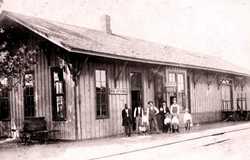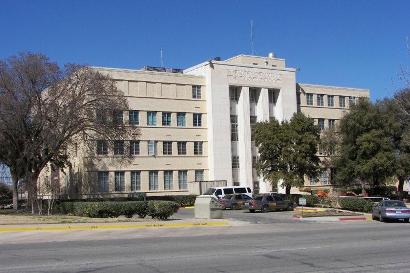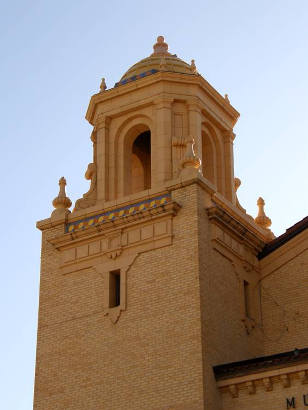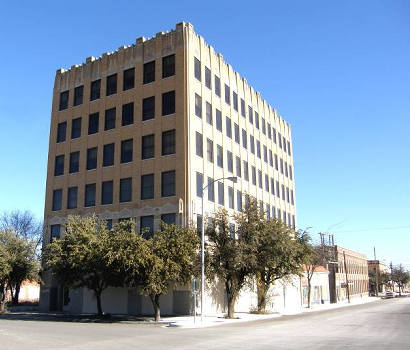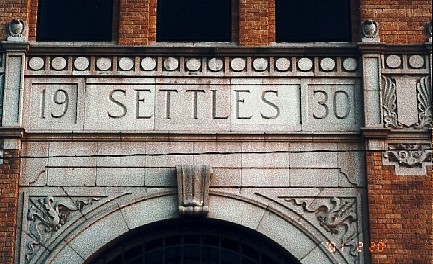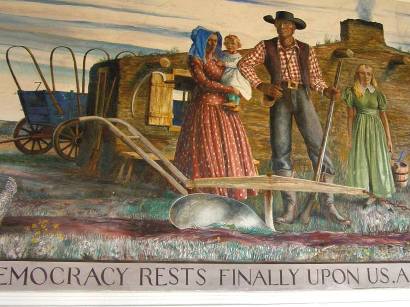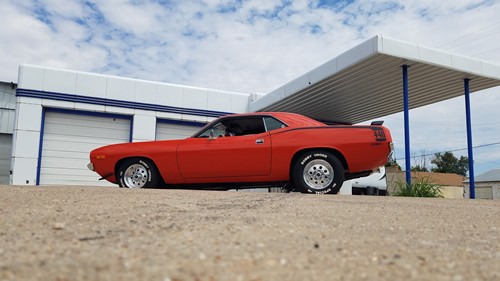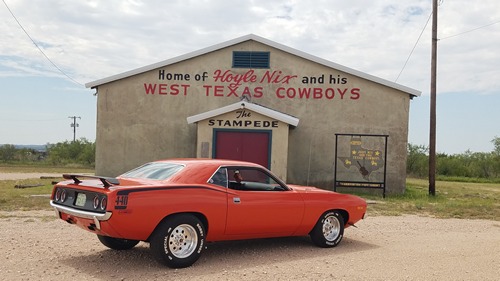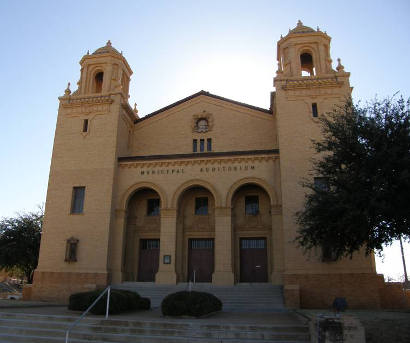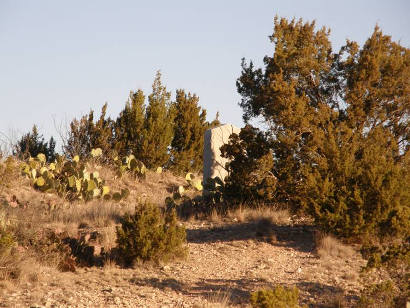Big Spring, Texas, Howard County seat: history, attractions, landmarks, photos, articles & more. (original) (raw)
"The Main Spring of West Texas"
Howard County Seat, Texas Panhandle
*/ West Texas
32� 14' 36" N, 101� 28' 31" W (32.243333, -101.475278)
US I-20 (US 80), US 87
Hwy 350, FM 700
Hwy 176
40 miles NE of Midland,
59 miles NE of Odessa, via I-20
86 miles NW of San Angelo via 87
108 miles W of Abilene via I-20
106 miles S of Lubbock via US 87
ZIP codes 79720-79721
Area code 432
Population: 28,187 Est. (2019)
27,282 (2010) 25,233 (2000) 23,093 (1990)
Book Hotel Here › Big Spring Hotels
The Texas & Pacific Depot, circa 1896Courtesy Doyle Phillips / FotoGrafica
Big Spring, Texas History
Big Spring in Brief
by Doyle Phillips
Big Spring has long been known as the crossroads of West Texas. The ancient spring for which the town was named attracted prehistoric people, Amerinds, Spaniards, Mexicans and Anglos. The fascinating Comanche 'War Trail' to Mexico branched at the spring.
Old tales are legion and photographic documentation is extensive.
Early explorers and cartographers noted the 'big spring of the Colorado River'. In 1839, Dr. Henry Connelly, a trader from Chihuahua, Mexico successfully led a huge caravan with a fortune in silver to Fort Towson, Oklahoma, stopping midway at the spring. U.S. Army Captain R.B. Marcy in 1849 lauded the beauty of the place and one of his Indian guides, Manuel, said that his brother-in-law died in a battle between Indians at the spring, fifteen years earlier. Official reports of Texas Rangers and U.S. Cavalry frequently mention the Big Spring.
When the town was formed about 1880 it consisted of canvas dwellings and a noticeable predominance of saloons. The citizenry was hard to tame; in the 1880 census Texas Rangers outnumbered citizens. Large mercantile stores were established to supply regional ranches of the Staked Plains. The Texas & Pacific Railroad hauled in materials of all kinds and took away cars full of cattle and buffalo bones for eastern markets. Railway workers contributed much to the culture of the thriving metropolis.
Two major highways were eventually constructed and prosperity continued. Fine hotels went up to accommodate commercial travelers and tourists from all over the world. Three airlines hubbed at the Big Spring Air Terminal - all in time for the massive discovery of oil in almost every part of Howard County. Even the Depression failed to kill the economy, or at least it seemed to be felt less. For a time there were four oil refineries located in the town.
Cotton farming thrived. Many gins were built in several communities throughout the county. At the beginning of World War II the substantial Big Spring Army Air Base was laid out and thus brought in new culture and new money. Big Spring and Howard County residents enlisted in the military services in unusually high numbers.
Music-making was an integral and large part of Big Spring area life from the beginning. Honky-tonks promoted many soon-to-be-famous performers. A magnificent municipal auditorium and city park with a unique amphitheater provided the stages for popular musical shows.
At one time Big Spring was reputed to have more Protestant churches than any place in the U.S., per capita. The population of the city once reached 35,000.
Big Spring Today
Skipping to the present, the town is now about 23,000 with a large part of the economy based on public-sector institutions, such as prisons, a regional VA Hospital and a state mental hospital. Although the decline in oil revenues has dramatically affected the entire region, employment rate is high and cost-of-living relatively low. New business ventures are encouraged by city government policies.
© Doyle Phillips
› Book Here
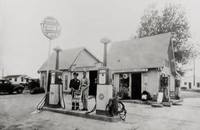 |
A Big Spring Service Station c.1948Photo courtesy Doyle Phillips / FotoGrafica |
|---|
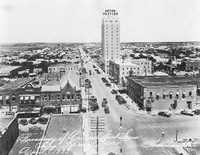 |
Big Spring with The Settles Hotel in the center Photo courtesy of Doyle Phillips / FotoGrafica |
|---|
Big Spring, Texas
Landmarks / Attractions / Photos
- The Spring - The town's namesake. next page
- Howard County Courthouses next page
- Settles Hotel next page
- Hanger 25 Air Museum:
www.hanger25.com
A museum of the Big Spring Army Air Corps Bombardier School (its purpose during WWII) and Webb AFB (1955-1977). - Potton House (circa 1901):
Second Street and Gregg - one of West Texas' best examples of Victorian architecture. Red sandstone construction with vintage furnishings. - Heritage Museum:
510 Scurry Street. Local History - Big Spring State Park:
On the southern edge of the city, this 340 acre park offers a scenic view of the city.
http://www.tpwd.state.tx.us.htm - City Park: 400 acres downtown, including the Comanche Trail Amphitheater and the spring that is the town's namesake.
- Moss Spring Centennial Marker -
About nine miles SE of Big Spring near Moss Lake. - Big Spring Hotels > Book Here
Stampede Dance Hall, opened May 8, 1954, Home of Hoyle Nix
Jimmy Dobson Photo, August 2017
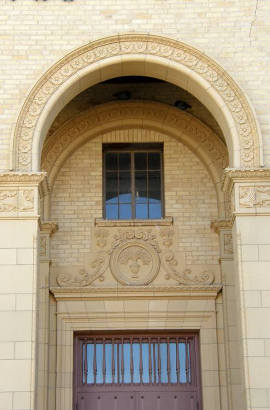
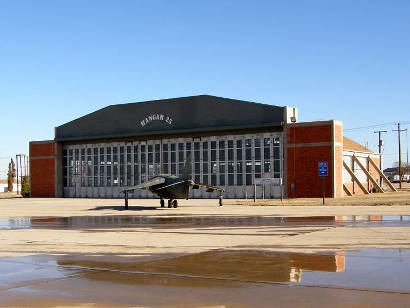
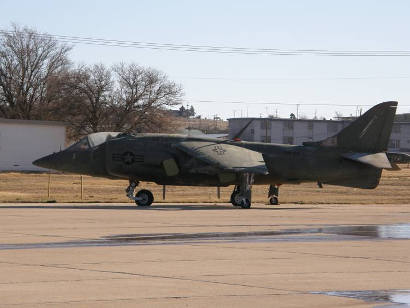
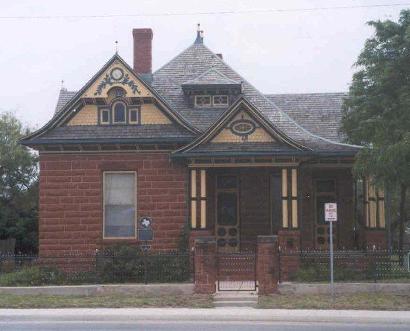
Potton House
200 Gregg St. (US 87)
Recorded Texas Historic Landmark
Terry Jeanson, June 2006 photo
Historical Marker:Potton House
Joseph Potton (1847-1920), a native of England and master mechanic for Texas & Pacific Railroad, built this Victorian residence in 1901. Designed by the Fort Worth firm of S. B. Haggart and Son, the house was constructed of Pecos sandstone with iron pillars and zinc gable decorations. Potton, a school board trustee, and his wife occupied the home after he retired in 1912 and often entertained here. Later their daughter, Mrs. Henry R. Hayden, and her family resided here.
Recorded Texas Historic Landmark - 1976.
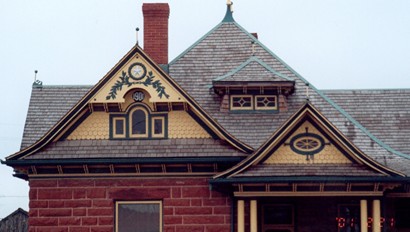
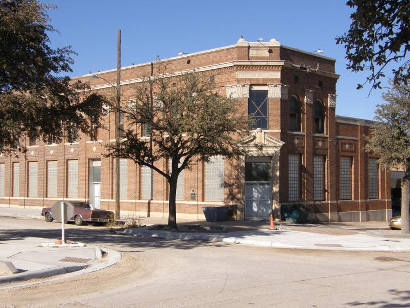
State National Bank Building
400 Main Street, Big Spring
Photo courtesy Barclay Gibson, December 2009
Historical Marker:
First National Bank in Big Spring
Chartered on April 19, 1890, the First National Bank of Big Spring opened for business on the first floor of a two-story building at the northwest corner of Second and Clinton (now Main) streets with an initial capital of $50,000. The post office occupied the south side of the building until 1927; the remaining space was rented to a variety of tenants. West Texas National Bank, chartered on February 28, 1903, opened in a building on the northeast corner of Second and Main, and in 1909 began construction of a new building on the southeast corner of Second and Main. The 1920s were prosperous years for the local banks, but the Depression of the 1930s brought hard times to both institutions. In 1934 the two banks merged and became the First National Bank in Big Spring. The new institution occupied the former West Texas National Bank building at the southeast corner of Second and Main. In 1963 the bank moved to new facilities at the southwest corner of Fourth and Main. Pioneer ranching families involved with the early banks and the merger made a lasting contribution to the growth and prosperity of Big Spring.
(1990)
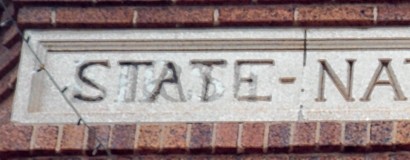
Notice the sign changed from First to State
TE Photo, 2001
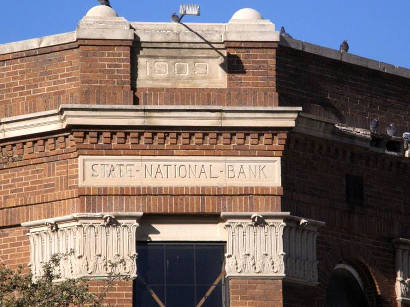
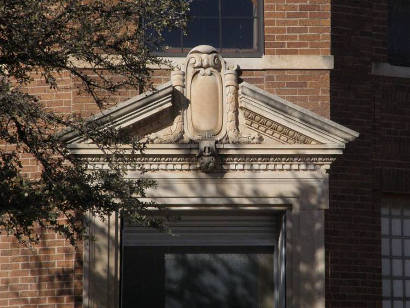
State National Bank Building architectural details
Photo courtesy Barclay Gibson, December 2009
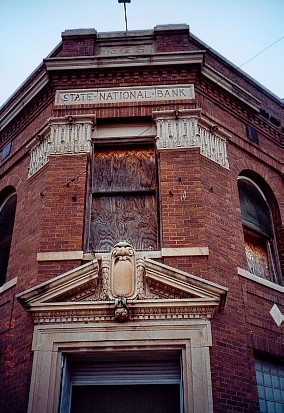
State National Bank Building
TE Photo, 2001
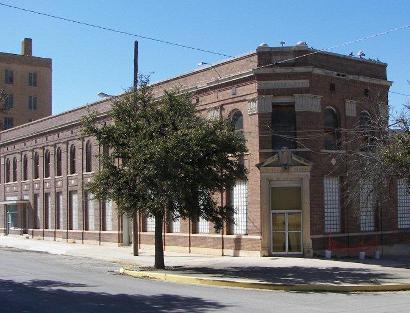
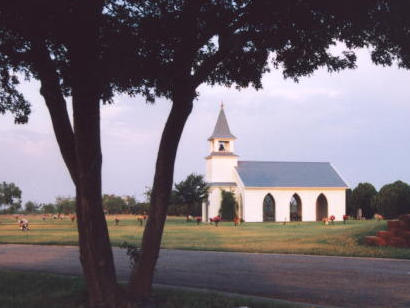
Big Spring Cemetery Funeral Chapel
Photo courtesy Barclay Gibson, February 2007
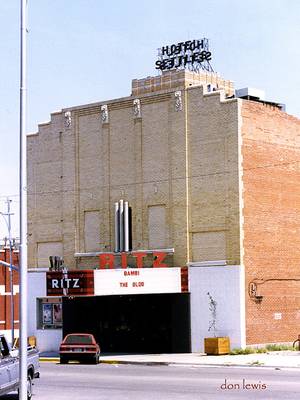
Ritz Theater
Photo courtesy Don Lewis
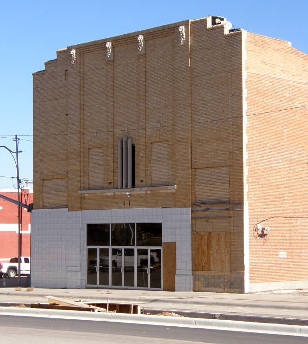
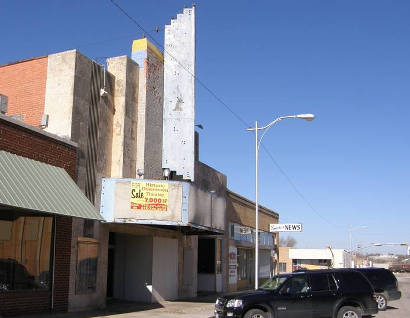
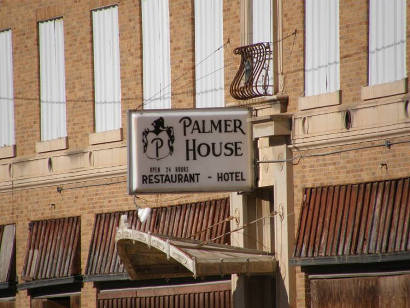
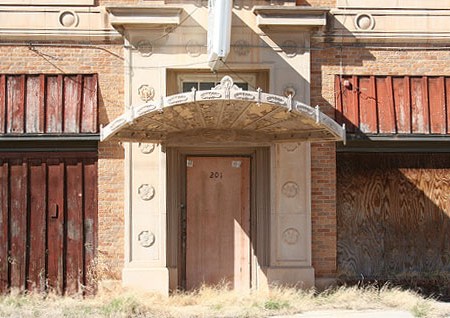
Palmer House
Photo courtesy Wes Reeves
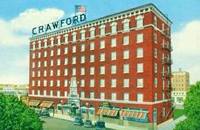 |
The Crawford Hotel Courtesy Doyle Phillips / FotoGrafica |
|---|
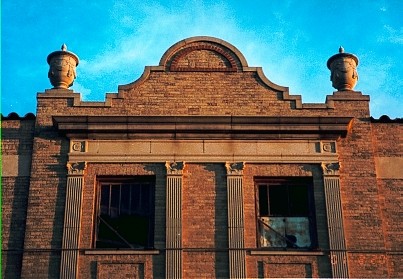
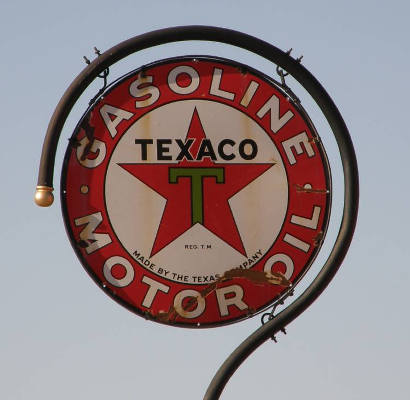
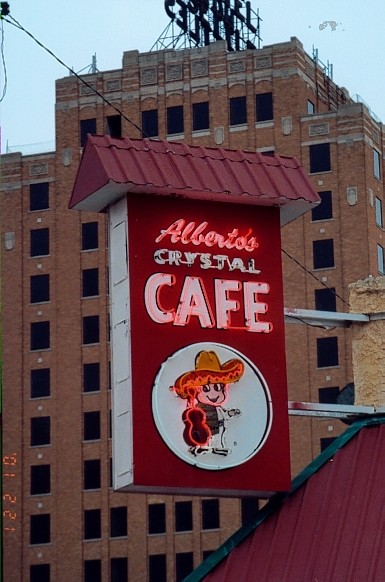
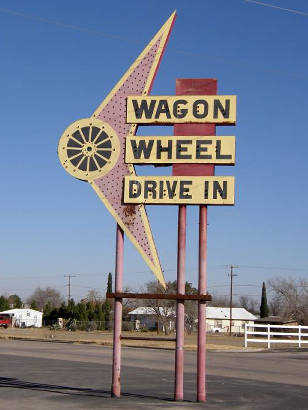
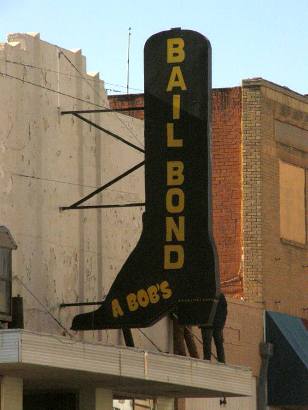
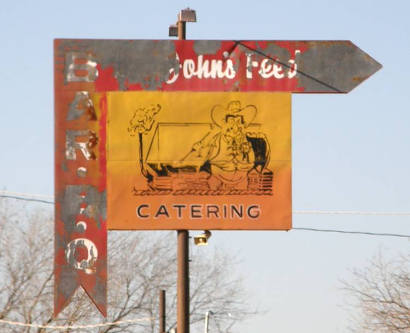
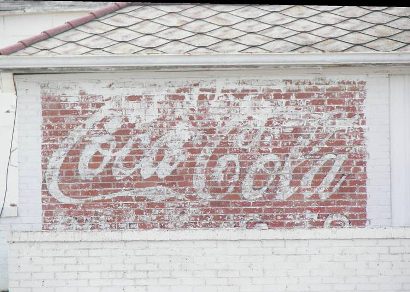
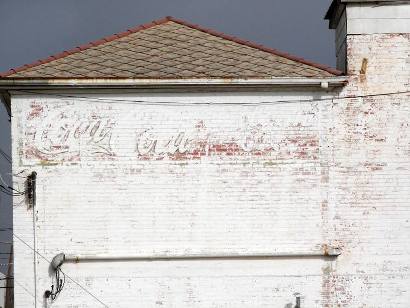
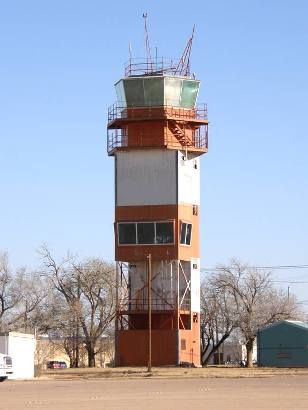
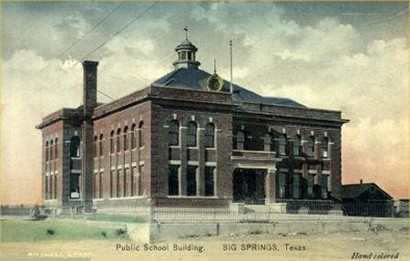
Big Spring Public School
Postcard courtesy www.rootsweb.com/ %7Etxpstcrd/
More Texas Schoolhouses
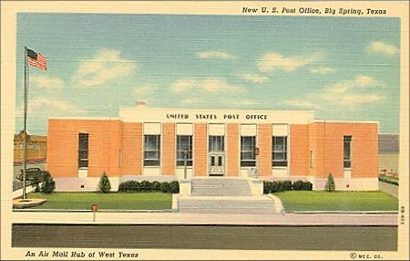
Post office in Big Spring. "An Air Mail Hub of West Texas"
Postcard courtesy www.rootsweb.com/ %7Etxpstcrd/
More Texas Post Offices
Nearby Destinations
- I-20 West 39 miles to Midland, another 20 miles west to Odessa.
- Hwy 87 South 86 miles to San Angelo.
- FM 33 south about 25 miles to Garden City.
Big Spring Chamber of Commerce:
215 W. 3rd Street 915-263-7641
Website: www.bigspringtx.com Big Spring Hotels › Book Here
Moss Spring Centennial Marker ›
40 or 50 years ago the Moss Spring Centennial Marker was easily reached from the north side of Moss Lake. It was a well known swimming hole during WWII where airmen training at the local Army Air Field came on weekends with their wives and girl friends to swim and hike to the distant Signal Mountain...
Photo Courtesy Barclay Gibson, January 2010
Big Spring Chronicles
Texas Escapes, in its purpose to preserve historic, endangered and vanishing Texas, asks that anyone wishing to share their local history, stories, landmarks and recent or vintage photos, please contact us.
Texas Escapes wishes to thank Doyle Phillips for the loan of photos from his collection and for writing the Big Spring history. Mr. Phillips is the author of numerous books on West Texas and Big Spring in particular. About Doyle Phillipsand more vintage photos *Texas Department of Transportation includes Howard County in the Panhandle Plains
